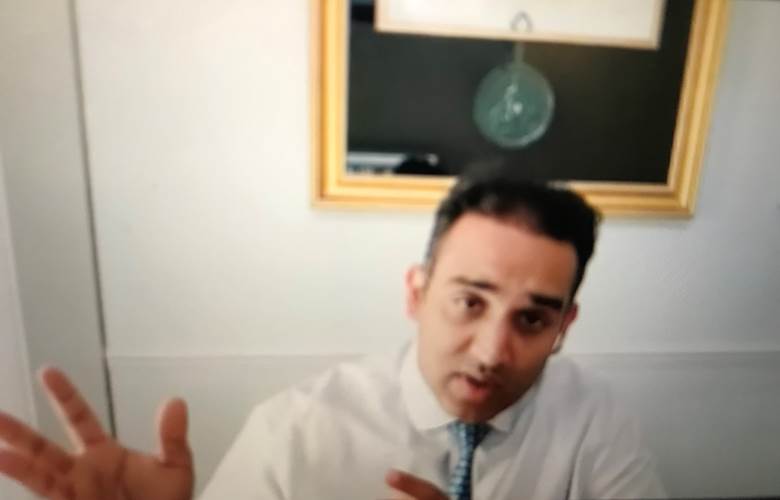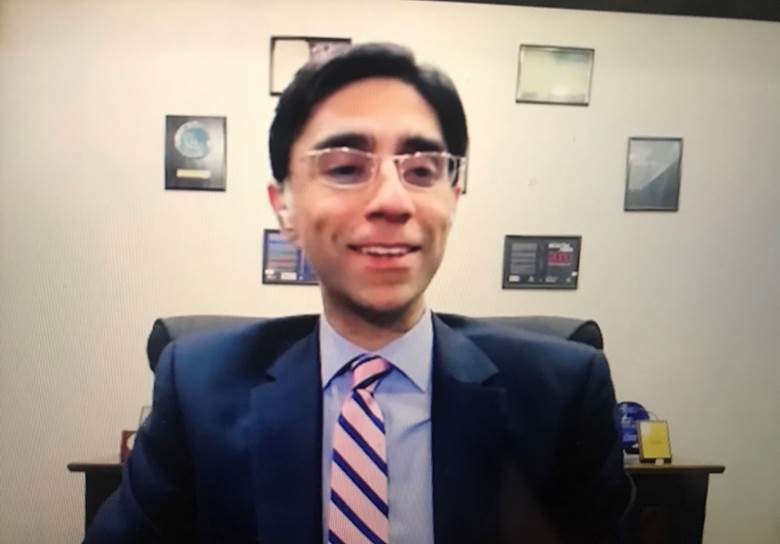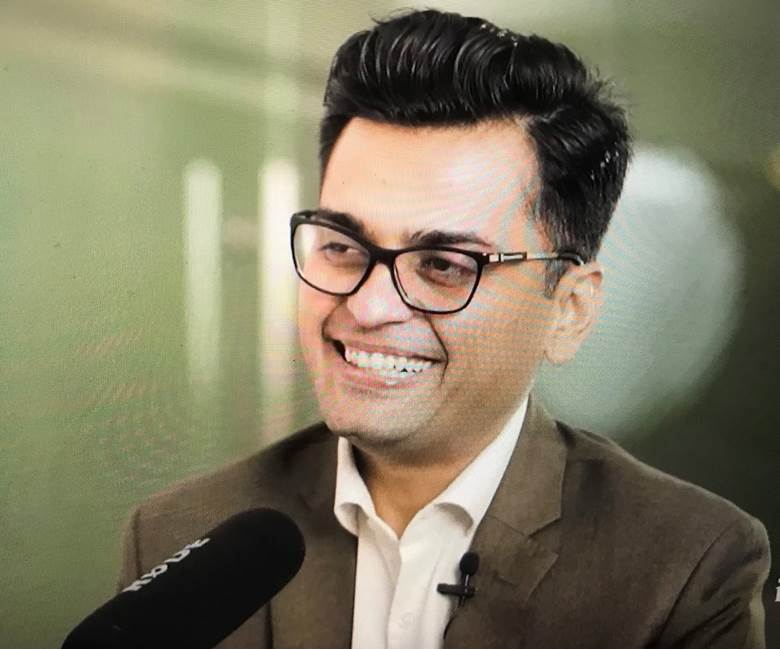
Baron Aamer Sarfraz

Dr Moeed Yusuf

Usman Nizamani
Moeed Yusuf and Aamer Sarfraz Discuss Their Careers on InferTalks
By Elaine Pasquini
Washington: Dr Moeed Yusuf and Baron Aamer Sarfraz were Usama Nizamani’s special guests on the December 16, 2023, episode of InferTalks, a digital platform offering news and insights on global issues.
Appointed to the House of Lords by former British Prime Minister Boris Johnson, Sarfraz, who grew up in Pakistan from ages 8 to 17, said he’d always had a passion to engage in public service. “That’s all I wanted to do.” And now, as a member of the House of Lords in the United Kingdom, he tries “to give the job my utmost,” he added.
The parliamentarian noted the average age in the House of Lords is 71 and he joined when he was 38, making him one of the youngest. “The big advantage was that I had grown up in Pakistan and therefore I know how to treat elders with the utmost respect and regard,” he explained. “And for me that was my sort of secret super power. But I am very lucky to get to sit with these folks who have changed the world in their fields…so you have a lot you can learn from them.”
Sarfraz described his “Eastern values” as “nuggets of wisdom that you have in your toolkit to use, and I think we overlook those sometimes.” One of them, he pointed out, is “your regard for our elders and how we care for our elders when they get older. I believe these Eastern values for me personally have hugely helped me in a really meaningful way.”
While Sarfraz’s primary parliamentary responsibilities and duties are in the UK and towards the British people, with respect to his Pakistani identity, he said it had not diminished. “I think it is really hard to dilute a formative identity of yours and I think one does not have to pick identities and put yourself in various buckets,” he said. “As far as my Pakistani identity is concerned, the truth of the matter is I still think very much in Urdu. My Muslim identity is a big part of me as well. I pray five times a day. All of these things are not incompatible at all.”
One way Sarfraz has stayed connected with his Pakistani roots is through his Lord Sarfraz Foundation he established for the socio-economic development of youth and children in remote parts of Pakistan.
“My foundation is a way to bring together various small bits of charity activity that we do as a family with our own limited resources,” he explained. “We don’t fundraise externally from any third parties,” noting that philanthropy is a family tradition dating back to his grandmother.
With respect to his foundation, he is most proud of his equine therapy for special needs children in Pakistan. Children with additional cognitive and physical needs were so excited and happy when they were sitting on a horse, he noted. “It’s also a form of entertainment and it’s a bit of a break for their parents as well.” Their therapy center in Islamabad serves about 85 children. “It’s free for the kids and we love it; and the kids love it, and the parents love it and we’re expanding now to Karachi and then we’d like to do every city.”
Sarfraz also discussed NetZeroAg, an agricultural technology business he founded 11 years ago to provide technological support for smallholder farmers, particularly regarding climate change challenges. “They are dealing with climate change as victims, but also they are contributing to greenhouse gas emissions, particularly those who are growing rice which is the second-largest emitter of methane in the agricultural world after cows which are the number one emission of greenhouse gas in agriculture,” he said. The company helps train tens of thousands of smallholder farmers on different farming techniques which reduce their greenhouse gas emissions. “I think we generate the highest quality data that anyone does in the world on methane reduction by smallholder farmers,” he stated. “Pakistan is right at the forefront of this.”
Yusuf, vice chancellor at Beaconhouse National University in Lahore and former National Security Advisor of Pakistan, also discussed climate change, noting it is now part of the national security paradigm. “We are one of the most vulnerable countries and there is no debate left on this,” he said. While there are a lot of policy discussions about relief, rehab and reconstruction after disasters, climate change has not really become a national issue around which the society has mobilized, he explained. “We mobilize around other very important things like corruption, politics, inflation, but many countries have climate right up there in terms of emotive and the sensitive, societal and social and we are not there yet.”
Nizamani questioned Yusuf on how his young age has affected his career. The scholar and former National Security Advisor responded that going into a room filled with 80-year-old policymakers when he was 25 [he’s now 42] was intimidating at first. “Over time I got used to it,” he said. “There is no substitute for experience. I think the kind of things you can pick up from them – the kind of narratives, the kind of conversations – you just can’t be a wholesale professional without that.”
But his biggest problem in his career, he confessed, is that he can’t live with inefficiency. “Status quo kills me in every possible way so I’m a bit of a disrupter…and when you get into a room with low energy where people are spending time defending the status quo, that I can’t take.”
Never having dealt with people younger than him, now, working at the university, he is struggling. “The new generation of 20-22 is an interesting one with new ideas – creative ideas, confidence, entitlement, good and bad – it all comes together,” he said. “Every day I learn from students at BNU. Anybody I speak to has an idea I’ve not thought of. This is the power of the new generation.”
(Elaine Pasquini is a freelance journalist. Her reports appear in the Washington Report on Middle East Affairs and Nuze.Ink.)

